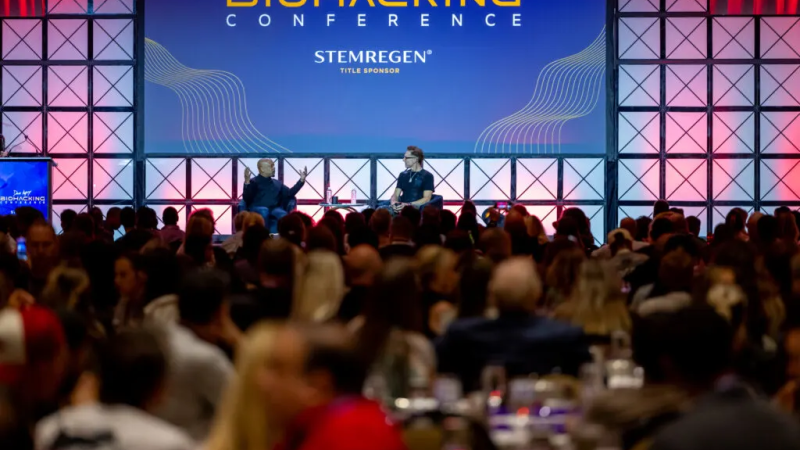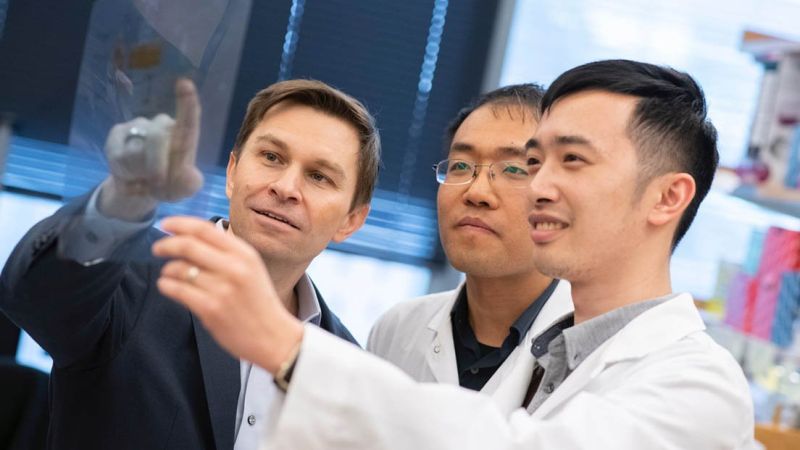
Exploring the Innovative Ideologies of Aubrey de Grey: A Glimpse into the Future of Longevity
Aubrey de Grey is a renowned scientist and futurist who has dedicated his life to studying and researching the phenomenon of aging. With his groundbreaking theories and innovative approach, de Grey envisions a future where human beings can live longer, healthier lives, free from the limitations of aging. This article will delve into de Grey’s visionary ideas, the science that supports them, the controversies they have ignited, and the potential impact they could have on society.
Understanding Aubrey de Grey’s Vision for Longevity
Aubrey de Grey, a renowned scientist and biomedical gerontologist, firmly believes that aging is not an inevitable part of the human condition but rather a disease that can be treated and ultimately cured. His groundbreaking research and visionary ideas have sparked a paradigm shift in the field of longevity studies.
De Grey’s central concept, known as Radical Life Extension, proposes that through advances in medical technology and biotechnology, we can halt and reverse the degenerative processes that lead to aging. This revolutionary approach challenges the traditional notion that aging is an irreversible process.
According to de Grey, the key to achieving Radical Life Extension lies in identifying and targeting the seven key types of damage that occur in the body as we age. These forms of damage include molecular and cellular changes that accumulate over time, leading to the decline of bodily functions. By understanding and addressing these underlying causes, de Grey believes we can potentially halt or even reverse the aging process altogether.
The Concept of Radical Life Extension
De Grey’s concept of Radical Life Extension goes beyond mere speculation. It is backed by extensive research and a deep understanding of the intricate mechanisms that drive the aging process. His visionary ideas have garnered significant attention and support from the scientific community.
By targeting the various types of damage that accumulate in our bodies over time, de Grey envisions a future where individuals can not only live longer but also enjoy a higher quality of life. This paradigm shift challenges the prevailing belief that aging is an inevitable and irreversible decline.
Through advancements in medical technology and biotechnology, de Grey believes that you can develop preventive measures and regenerative therapies to combat the underlying causes of aging. By doing so, he argues, you can not only extend the human lifespan but also improve healthspan – the number of healthy, productive years in one’s life.
De Grey’s Approach to Aging as a Disease
De Grey’s unique perspective on aging sets him apart from many scientists who view aging as a natural, unavoidable process. He firmly believes that aging should be treated as a medical condition and advocates for a comprehensive approach to address it.
His approach encompasses preventive measures, such as lifestyle interventions and early detection of age-related diseases, as well as regenerative therapies that aim to repair and rejuvenate the body at a cellular level. By tackling the root causes of aging, de Grey believes we can not only extend lifespan but also enhance the overall well-being of individuals.
De Grey’s work has sparked a global conversation about the possibilities of Radical Life Extension. While there are still many challenges to overcome and further research to be conducted, his visionary ideas have opened up new avenues of exploration and have the potential to revolutionize the way we view and approach the aging process.
The Science Behind De Grey’s Ideologies
The foundation of de Grey’s theories lies in the fields of biotechnology and regenerative medicine. By harnessing the power of these disciplines, scientists can develop therapies that target the specific cellular and molecular damage associated with aging.
De Grey’s ideologies are rooted in the belief that aging is not an inevitable process, but rather a condition that can be treated and even reversed. His theories have gained significant attention in the scientific community, sparking debates and discussions about the future of aging and longevity.
One of the key aspects of de Grey’s theories is the role of biotechnology in extending the human lifespan. Biotechnology offers a wide range of tools and techniques that can be used to repair and regenerate damaged tissues and organs. Stem cell therapies, for example, have shown promise in regenerating damaged heart tissue and restoring function in patients with heart disease.
The Role of Biotechnology in Longevity
Biotechnology plays a crucial role in the pursuit of longevity. It offers the potential to repair and regenerate damaged tissues and organs, paving the way for a future where age-related diseases can be effectively treated or even prevented. Stem cell therapies, gene editing techniques, and tissue engineering are just a few examples of the remarkable advancements that have the potential to revolutionize healthcare in the coming decades.
Gene editing techniques, such as CRISPR-Cas9, have the potential to modify the genes responsible for aging-related diseases, effectively eliminating the underlying causes of these conditions. This opens up new possibilities for preventing age-related diseases and extending human lifespan.
Tissue engineering1 is another exciting area of biotechnology that holds promise for longevity. Scientists are working on developing artificial organs and tissues that can replace damaged or aging ones. This could potentially eliminate the need for organ transplants and provide a long-lasting solution for age-related organ failure.
The SENS Research Foundation and Its Goals
Listen to this podcast2 and learn more about Dr. Aubrey de Grey’s theory on aging, longevity, and adding years to your health span.
To further his vision, de Grey founded the SENS Research Foundation3 – a non-profit organization committed to advancing regenerative medicine and finding a cure for aging. Through research programs, collaborations, and public outreach, the foundation aims to accelerate the development of rejuvenation therapies and promote the adoption of a proactive approach to aging.
The SENS Research Foundation focuses on a comprehensive approach to aging, targeting the seven major types of cellular and molecular damage that accumulate in the body over time. These include mitochondrial mutations, cellular senescence, extracellular matrix stiffening, and others. By addressing these underlying causes of aging, the foundation aims to develop therapies that can not only extend lifespan but also improve healthspan – the period of life spent in good health.
Through its research programs, the SENS Research Foundation collaborates with scientists and experts from various fields to explore innovative approaches to regenerative medicine. The foundation also actively engages with the public, raising awareness about the potential of rejuvenation therapies and advocating for a shift in the way society views and approaches aging.
De Grey’s ideologies and the work of the SENS Research Foundation have sparked a new wave of scientific inquiry into the possibilities of extending human lifespan and improving health in old age. While there is still much to learn and discover, the advancements in biotechnology and regenerative medicine offer hope for a future where aging is no longer a barrier to a long and healthy life.
Debates and Controversies Surrounding De Grey’s Theories
While de Grey’s ideas have garnered significant attention and support, they have not been without controversy. One of the main points of contention revolves around the ethical implications of radical life extension.
The Ethical Implications of Radical Life Extension
The prospect of significantly extending the human lifespan raises complex ethical questions. Issues such as overpopulation, resource allocation, and the potential for creating social inequalities come to the forefront. Some argue that radical life extension could exacerbate existing societal problems, while others see it as an opportunity to address them through improved healthcare systems and advancements in technology.
Overpopulation is a concern that arises when discussing radical life extension. With people living longer, the global population could increase exponentially, putting a strain on resources and the environment. Critics argue that this could lead to scarcity, competition, and conflicts over limited resources. On the other hand, proponents of de Grey’s theories believe that advancements in technology and resource management can mitigate these challenges. They argue that with longer lifespans, societies will have more time to develop sustainable solutions and improve resource allocation.
Another ethical concern is the potential for creating social inequalities. If only the wealthy have access to life-extending technologies, it could lead to a significant disparity between the rich and the poor. Critics argue that this could exacerbate existing inequalities and create an even more divided society. However, proponents of radical life extension counter that argument by emphasizing the potential for improved healthcare systems. They believe that as life-extending technologies become more accessible and affordable, the benefits can be shared more widely, reducing the risk of creating social inequalities.
Scientific Criticisms and Rebuttals
De Grey’s theories have also faced scientific criticisms, with some experts questioning the feasibility of his proposed strategies and the plausibility of achieving true rejuvenation at a cellular level. However, de Grey and his supporters argue that these objections stem from a lack of understanding or a conservative mindset that is resistant to radical ideas.
One scientific criticism revolves around the challenges of reversing the aging process at a cellular level. Some experts argue that the complexity of human biology and the intricacies of aging make it unlikely that we can achieve true rejuvenation. They point to the numerous biological processes and interactions that contribute to aging, suggesting that it may be impossible to address all of them comprehensively. However, de Grey and his supporters counter these arguments by highlighting the progress that has already been made in understanding the underlying mechanisms of aging. They believe that with continued research and advancements in biotechnology, it is possible to develop interventions that can slow down or reverse the aging process.
Another scientific criticism focuses on the feasibility of implementing de Grey’s proposed strategies. Some experts argue that the practical challenges of implementing these strategies on a large scale are insurmountable. They question the scalability of the proposed interventions and the potential side effects they may have. However, de Grey and his supporters argue that these challenges are not unique to radical life extension but are common in any scientific endeavor. They believe that with sufficient resources, collaboration, and dedication, these challenges can be overcome.
The Potential Impact of De Grey’s Vision on Society
If de Grey’s vision becomes a reality, it would have profound implications for society as a whole.
The Socioeconomic Consequences of a Longer Lifespan
Achieving significant advances in longevity could reshape our socioeconomic landscape. It would require reevaluating retirement age policies, creating new career opportunities for an aging population, and ensuring equitable access to healthcare and rejuvenation therapies. Governments, businesses, and individuals will need to adapt to a world where people can lead longer, more productive lives.
The Future of Healthcare in a Post-Aging World
A world without aging would necessitate a transformation of our healthcare systems. The focus would shift from treating age-related diseases to preventing them altogether, leading to a shift in medical research and healthcare expenditure. Furthermore, the demand for regenerative medicine and rejuvenation therapies would skyrocket, driving innovation and potentially transforming the healthcare industry.
The Road Ahead: Challenges and Opportunities in Longevity Research
While the pursuit of longevity holds immense promise, it also presents significant challenges that need to be addressed.
Funding and Support for Longevity Research
Advancing longevity research requires substantial funding and support from both the public and private sectors. Governments, philanthropists, and investors need to recognize the potential benefits and societal importance of this field and allocate resources accordingly. Collaboration between academia, industry, and research institutions is also crucial to accelerate progress in this area.
The Role of Public Perception and Acceptance
Public perception and acceptance play an integral role in the success of longevity research. Widespread education and awareness campaigns can help dispel misconceptions, address fears, and garner public support. Cultural attitudes towards aging and the pursuit of longevity may need to shift to reflect a more proactive, forward-thinking mindset.
Conclusion
In conclusion, Aubrey de Grey’s innovative ideologies present a thought-provoking vision of a future where aging is no longer an inevitable part of the human experience. His theories, backed by the fields of biotechnology and regenerative medicine, offer hope for a world where human beings can lead longer, healthier lives. However, these ideas also raise important ethical and scientific debates, and their realization would require significant societal transformation and research advancements. Only time will tell if de Grey’s vision will become a reality, but his work undoubtedly pushes the boundaries of what is perceived as possible, inspiring us to explore the frontiers of longevity research. Add Accuri® Vitality ↑® NAD+ Booster, a groundbreaking NAD supplement, to your daily routine and start your journey to a healthier you.
Lastly, if you’re interested in going deeper on health-related content, here are a few of our recent posts that you may want to read:
- Understanding Your Body Better with a Biological Age Test
- The 24 Hottest Biohacking Trends in 2024
- 9 Powerful Benefits of Optimizing Your NAD
- Why Muscle Is Your Biggest Alley in the Anti-Aging Strategy
Referenced Sources:
Read More














